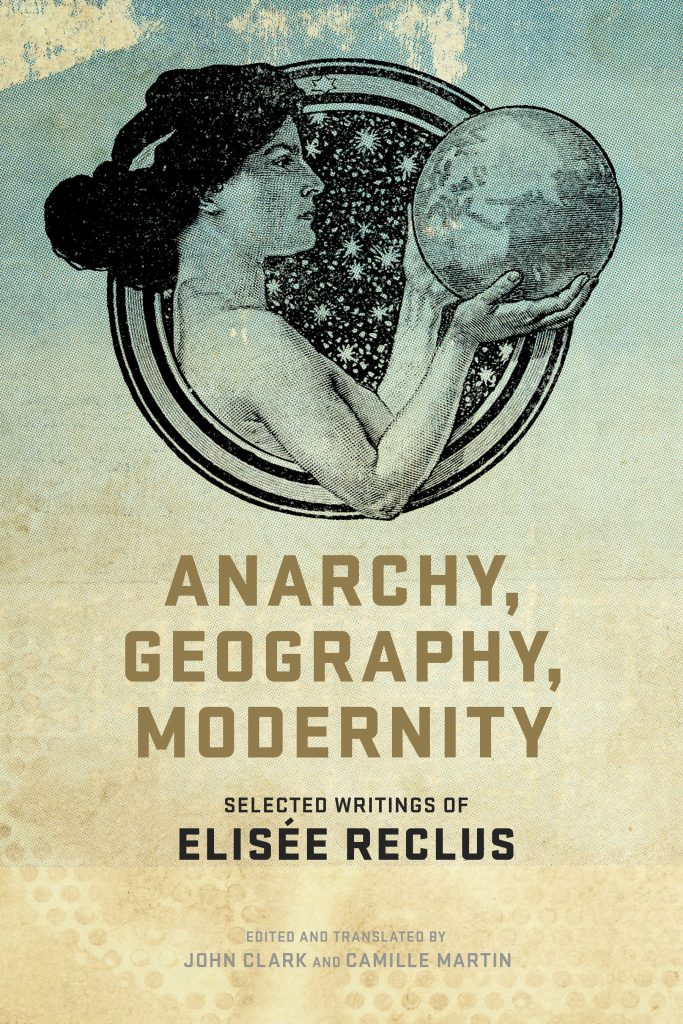By Vanessa Sloan Morgan
AAG Review of Books
March 21st, 2016
L’homme est la nature pregnant conscience d’elle-même [Humanity is nature becoming self-conscious].—Reclus (p. 3)
Reclus’s revulsion of the slave trade during the antebellum period in Loui-siana and commentary on the racist events that he wit-nessed while in the United States made long and lasting impressions on Clark and Martin.
Indeed, the revulsion that Reclus expressed in this writing permeated the phi-losophy that budded throughout his lifetime, an ethic de-scribed as a “righteous moral indignation that underlies his [Reclus’s] social analysis” (p. 86). Their first introduc-tion to Reclus’s writing was recovering and translating his commentaries on Louisiana in the 1850s (Clark and Mar-tin 2004). From this New Orleans travel account, they began to explore the geographer-anarchist’s vast oeuvre.
In their thoughtful collection of select works of Elisée Re-clus, John Clark, a New Orleans activist and philosophy professor, and Camille Martin, a poet and artist, outline exceptionally well how Reclus’s “dialectical perspective” portrays a “unity of history [that] must be discovered through an understanding of the diversity of phenomena, both natural and social” (p. 5). This dialectical focus, the authors contend, is what separates the grand narrative style that Reclus’s nineteenth-century contemporaries often fell victim to, with the grandi-ose scale and sheer vastness of works that Reclus was able to explore in his five decades of research and writ-ing (1850s–1905). Clark and Martin suggest that “Reclus’ emancipatory vision of history is a sweeping one with universalistic dimensions, but it encompasses a social and ecologi-cal ethic that is based on a concern for the self-realization of all beings in their uniqueness and particularity, and a practice of love and care for those beings” (p. 6). The authors thus strive to demonstrate that the insightful and timely materials that Reclus produced over his lifetime, especially the en-trenched ecological ethic embodied in the quote that opens this review, one that is at the core of Reclus’s works, remain relevant, if not imperative, to the discipline of ge-ography, ecoanarchism and green anarchism, and social transformation today. To do so, they separate their book into two sections.
Part I offers an introduction to Reclus’s social thought—an outline of an anarchist inspired and deeply ecologically ethical social geography that views humanity and the environment as intimately intertwined. Covering topics from Reclus’s upbringing, to his works on the dialectic of nature and culture, to racism and interpersonal relation-ships, Clark and Martin coherently steer readers through Reclus’s social thought, providing critiques and insights along the way. Writing during the late nineteenth and early twentieth centuries, Reclus does fall into the tempo-ral traps of the period—outdated and prejudice-inspired language abound, with the revolutionary zeal of his day setting the tone for much of his musings. The authors ad-dress these tendencies, while reminding readers of why the substance and key themes of Reclus’s work are worth our respect. For the most they are convincing, although there are some exceptions. Mention of Reclus’s “marriage to a woman of mixed African and European ancestry” as exemplar of his “intensified personal involvement” (p. 89) with combating racism—a form of domination that Reclus interpreted as “contemptuous, hierarchical ranking of human beings” that conflicted with “his sense of human solidarity, social equality, and his respect for the achievements of all cultures” (p. 89), might be prob-lematic for some readers. Reclus rejected state and reli-giously sanctioned unions, prompting Clark and Martin to contend that he was a precursor to feminist move-ments holding similar beliefs. Nevertheless, what this example does highlight is a key and differentiating char-acteristic of Reclus’s work: the interpersonal and personal possibilities and affect that permeate his theorizing andsocial critiques.
The dialectical relationship between Reclus’s ideas on interpersonal and social relations are perhaps most suc-cinctly summarized by Clark and Martin when comment-ing that Reclus believed that “a free society can exist only if the principles of freedom that are to guide society are put into practice in the most intimate and personal details of lives” (p. 92); freedoms that in “mazelike network[s] of power,” such as bureaucracy, see “accountability become impossible” (p. 78). The concept of interpersonal practice and autonomy, of freedom and responsibility, underlie all that is unearthed in Reclus’s writing. In one such ex-ample, Reclus’s commentary on economic inequality and class privilege is identified as “fundamentally an ethical one that focuses on the fact that it destroys the human potential to achieve the good life, whether on the part of the oppressed or of the oppressors” (p. 86). Keeping with the spirit of dialectical thinking, Clark and Martin never stop at outlining this interpersonal relationship. Rather, and largely without fail, they demonstrate how Reclus’s ideas manifest in broader social contexts and structures, linking back to anarchist philosophies and social geog-raphies. Thus, Reclus’s “fundamentally ethical” commen-tary on economic and class privilege are pushed beyond, linked to Adam Smith’s writings on mechanized labor, Bakunin’s scientific intelligence, and Marx and contem-poraries’ revolutionary criticisms of the alienation and ex-ploitation that accompany capitalist economies, to high-light Reclus’s ideas on the technological rationality that was emerging under “free” labor systems. Using this same style of writing—choosing a topic, isolating Reclus’s work on the topic, and then relating it back to historical and contemporary literature, while offering critiques—the au-thors provide ample fodder for reflection, demonstrating the relevance of Reclus’s work to the discipline of espe-cially social geography and beyond.
Part II features Clark and Martin’s French-to-English trans-lations. Some of Reclus’s writings (from 1866–1905) are translated for the first time. Through these translations, key themes introduced in Part I are emphasized. Indeed, Reclus’s personal philosophy—his “righteous moral indig-nation”—is made clearest in reading his original (albeit translated) works on, for instance, interpersonal relations:
We must search fiercely for the truth, discover our own personal duty, learn to know ourselves, engage continu-ally in our own education, and act in ways that respect the rights and interests of our comrades. Only then can one become a truly moral being and awaken to a feeling of responsibility. Morality is not a command to which one submits, a word that one repeats, something parsley external to the individual. It must become a part of one’s being, the very product of one’s life. This is the way that we anarchists understand morality. (p. 124)
Strategically offering selected works, such as this quote extracted from Anarchy [L’Anarchie] (Reclus 1896), Clark and Martin are able to complement the first part of the book (or perhaps the other way around) and encourage readers to reflect on Reclus’s work from a century or more ago.
Although the authors advise that Reclus’s writing must be read in “relative terms,” their critiques in the first sec-tion at times fall short of their own cautionary advice—a caution that could arguably be applied to much anarchist scholarship. For instance, while discussing the role of technology and mechanized labor, an example provided earlier, they extract Reclus’s words, stating: “never did ancient slavery more methodically mold and shape hu-man material to reduce it to being a tool” (pp. 87–88). Al-though it is not being argued that technological advances did not present novel forms of exploitation, blanket state-ments such as the one provided here without attention, or serious attempt, to consider gender, race, sexual orienta-tion, or the gamut of other interlocking systems of oppres-sion, often expressed as isolates of identity often excluded in anarchist geographies, simplify the potentially fierce and insightful lines of the argument. Nor is the Eurocen-tric tendency that seems to permeate nineteenth-century anarchist thought commented on, despite pointing to Re-clus’s dialectical view of processes of colonialism—a view that saw Reclus speak out against the racist, culturally genocidal, and environmentally plunderous acts involved, simultaneously recognizing the positive effects of colo-nialism brought about in terms of what could be classified as “modernity” (p. 80).
This book is admittedly intended to be an introduction to Reclus’s work, and the authors should be commended for doing such a splendid job on this front! In the same vein, though, and given that anarchist philosophy still, often, perpetuates paternalistic tendencies and dynam-ics, to identify Reclus as a feminist avant la lettre (see p. 92), or as starkly dedicated to antiracism and greatly affected by the atrocities of Louisiana’s slave trade (e.g., p. xi, 11–12), as devoutly anti-imperialist (yet in a dialectical relationship with colonialism [p. 80]), and not to more explicitly intersect or explicate these arguments is prob-lematic. Nevertheless, when read in the spirit of social ge-ography and in its temporal contexts (viz. the nineteenth century), geographer Yves Lacoste’s praise of Reclus, call-ing his work the “‘epistemical moment . . . the epistemi-cal turning’ in the history of geography” (p. 52) is indeed worthy of consideration. Lacoste also avers, “Geography was linked essentially to the state apparatus, not only as a tool of power, but also as an ideological and propagan-distic representation. Reclus turned this tool against the state apparatus, the oppressors and the dominant classes” (p. 52). Moreover, Clark and Martin believe Reclus’s “so-cial geography and the social philosophy grounded in it become part of the process of the planetary history of liberation” (p. 52)—part of humanity becoming self-con-scious. Just as Reclus is revered for untethering geography from the confines of the state, it would be heartening to see anarchist geographers take up Reclus’s work in the spirit of furthering anarchist philosophies’ potential to push beyond interlocking and multiple systems of oppres-sion. Reclus’s work as provided by Clark and Martin would be a more than suitable platform to advance this project.
References
Clark, J. P., and C. Martin, eds. 2004. Elisée Reclus’ voyage to New Orleans: Anarchist impressions of the old south.2nd ed. Thetford, VT: Glad Day Books.
Reclus, E. 1896. L’Anarchie [Anarchy]. Paris: Aux Bureau des “Temps Nouveaux.”
Back to John P. Clark’s Author Page | Back to Camille Martin’s Editor Page







